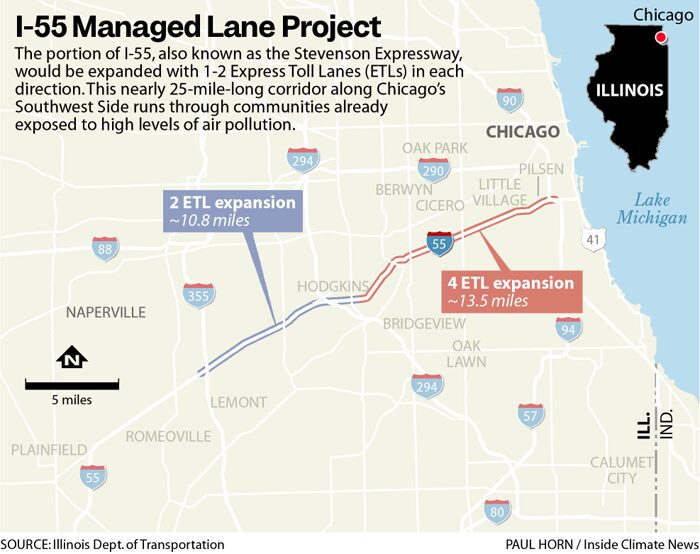Environmental advocates and community groups already exposed to high levels of air pollution fear that additional lanes will exacerbate health risks in Southwest Side neighborhoods.

By Aydali Campa, Brett Chase, Chicago Sun-Times
May 23, 2023
Having spent most of her life in Chicago’s Little Village neighborhood, Sara Cortes learned to live with bad-smelling air that created a haze in the summer.
About a year ago, Cortes, 38, was diagnosed with an untreatable lung condition that makes her tired and leaves her short of breath.
So she was shocked when she learned of a fast-moving plan in Springfield to expand the nearby Stevenson Expressway, part of Interstate 55, with additional lanes, bringing more traffic and more pollution.
“It’s definitely a concern for me,” said Cortes. “The air quality in Little Village has been bad for a long time.”
Introduced at the tail end of the Illinois legislative session, a pair of measures that promote private funding of road projects are moving through quickly as state lawmakers try to wrap up their session this week. One is a resolution that would allow state transportation officials to find private funding for the Stevenson expansion, which runs through Little Village and other communities, and it is in the Senate after moving quickly through the House Chamber. The other is an even more expansive rewriting of rules to encourage private dollars for state transportation projects, which was added as an amendment to a large spending bill on Friday.
https://www.ilga.gov/legislation/fulltext.asp?DocName=&SessionId=112&GA=103&DocTypeId=HJR&DocNum=0023&GAID=17&LegID=149368&SpecSess=&Session=
“Expanding highway capacity will incentivize more driving and more harmful emissions in an area already burdened by high asthma rates and other chronic health problems,” said José Miguel Acosta Córdova of the Little Village Environmental Justice Organization.
Community, environmental and health organizations oppose the 11th-hour moves to bring private highway funding to Illinois, proposals supported by labor and business groups.
They fear that the changes may mean less oversight and transparency of the planning processes in which major road expansions are approved.
For some environmental justice communities, there is much concern.
Residents in Little Village, a neighborhood on Chicago’s Southwest Side, experience some of the worst air pollution in the city, an analysis last year showed. Every day, trucks from an industrial corridor travel through the neighborhood to and from I-55.
https://chicago.suntimes.com/2022/5/16/23069860/dangerous-air-we-breathe-mapping-chicago-air-pollution-hotspots-pm2-5-particulate-matter
“Semi-trucks come through this residential area all of the time,” said Esmeralda Hernandez, 46, a lifelong resident of Little Village.
Adding new lanes to the expressway near her home is not the solution to addressing congestion and pollution, she adds.
“There has to be another answer than putting in more lanes,” Hernandez said.
A legislative plan to widen the Stevenson Expressway and promote private funding of road projects in Illinois has community, health and environmental organizations alarmed. Credit: Chicago Sun-Times
Marc Poulos, executive director of the labor management group for Local 150 International Union of Operating Engineers, said private money is needed to make sure road projects get funded. Some labor and business advocates have wanted to see the state enter into its first private transportation partnership for a number of years, and the proposed changes are a “modernizing of the statute” that allows such projects.
The widening of the Stevenson has been envisioned since the expressway was built in the 1960s, he said.
The project is one of several roadway building or expansion projects in the country that environmentalists and community groups have criticized, saying that new or wider roads that accommodate more traffic will result in more cars on the road, ultimately increasing air pollution. Research has generally shown that traffic reduction resulting from highway expansions is often brief before leading to a subsequent increase in volume, as the increased road capacity tends to attract more drivers—a theory known as induced demand.
Transportation is a top source of greenhouse gas emissions in Chicago and Illinois, a freight hub where 2 million people live near warehouses enveloped by truck pollution and face heightened respiratory health risks. Research has shown that traffic pollution in Chicago is concentrated in predominantly Black and Hispanic neighborhoods on its South and West sides.
Little Village resident Alexis Sanchez, 26, said he only learned about the proposed plan last week from a local environmental justice organization and believes that the Stevenson Expressway expansion would not be good for the community’s health.
A couple of weeks ago, he kept his bedroom window open overnight. “It’s a pretty familiar smell,” but that night, the diesel exhaust odor woke him up, he said.
He’s lived near the Stevenson Expressway almost all of his life and is used to trucks passing through his neighborhood, but that night was an “eye-opener,” he said. “I don’t know what I’m breathing that could potentially affect my health in the future.”
Sanchez’s father, Alejandro Sanchez Riviera, 51, is often stuck in traffic on the Stevenson Expressway on his way back from work. He hopes that additional lanes alleviate traffic congestion and improve air quality in the area. “Sometimes we open the windows, but it feels like we’re just smelling smoke,” he said.
Originally from Mexico City, Sanchez Riviera says he feels at home and close to his roots in Little Village but is disappointed to see few efforts to address air pollution.
“It’s a sanctuary for us, and sometimes we get used to what comes with the air, but we need to see some change,” he said. “We don’t know what is in the air.”
HJ0023 LRB103 31252 ECR 58279 r
1
HOUSE JOINT RESOLUTION
2 WHEREAS, Interstate 55 (I-55) experiences serious
3 congestion daily for extended periods of time and is unable to
4 acclimate to current traffic demands due to limited roadway
5 capacity, roadway design constraints, high truck volumes, and
6 numerous interchanges; and
7 WHEREAS, Commuters have limited public transit options for
8 their commutes, which has consequently led to increased
9 congestion, long and unreliable travel times, reductions in
10 safety, and increased costs for delivery of goods and
11 services; and
12 WHEREAS, To improve automobile transportation along the
13 I-55 corridor from the I-355 (Veterans Memorial Tollway) to
14 the I-90/I-94 (Dan Ryan Expressway), the Illinois Department
15 of Transportation (IDOT) initiated the “I-55 Managed Lane
16 Project” to study the advantages of adding managed lanes; and
17 WHEREAS, A managed lane is a type of highway lane that is
18 administered via a management scheme, such as lane use
19 restrictions or variable tolling, to improve traffic flow,
20 provide commuters with travel options, increase average
21 vehicle occupancy, and support transit ridership; and
HJ0023 – 2 – LRB103 31252 ECR 58279 r
1 WHEREAS, The project assessed implementing two Express
2 Toll Lanes (ETLs) in each direction on the eastern section of
3 the corridor, between I-294 (Central Tri-State Tollway) and
4 the I-90/94; additionally, the section from I-355 to I-294
5 will have one ETL in each direction; and
6 WHEREAS, IDOT led this project in partnership with the
7 Federal Highway Administration (FHWA); furthermore, to reach a
8 broad range of stakeholders, the partnership sought input from
9 area residents, municipalities, counties, townships, agencies,
10 elected officials, and interested groups; and
11 WHEREAS, An environmental study has been completed to meet
12 the National Environmental Policy Act (NEPA) requirements; the
13 NEPA requires federal agencies to analyze the environmental
14 impacts of the proposed actions and requires the evaluation of
15 reasonable alternatives; and
16 WHEREAS, Phase II, the “Final Design and Contract Plan
17 Preparation,” is funded in IDOT’s Fiscal Year 2020-2025
18 Proposed Highway Improvement Program; however, IDOT does not
19 presently have funding for Phase III which is the construction
20 of the project; and
21 WHEREAS, IDOT is evaluating alternative project delivery
22 opportunities, such as a public-private partnership or P3, to
HJ0023 – 3 – LRB103 31252 ECR 58279 r
1 involve industry and best leverage resources for this project;
2 using the P3 method, IDOT can deliver an I-55 project that is
3 the safest, most efficient, and most cost-effective; and
4 WHEREAS, Under the Public Private Partnership for
5 Transportation Act, IDOT must receive approval from the
6 General Assembly to pursue the project as a P3 and see the
7 project through to completion; therefore, be it
8 RESOLVED, BY THE HOUSE OF REPRESENTATIVES OF THE ONE
9 HUNDRED THIRD GENERAL ASSEMBLY OF THE STATE OF ILLINOIS, THE
10 SENATE CONCURRING HEREIN, that we support the “I-55 Managed
11 Lane Project” and IDOT’s efforts to pursue the project as a P3.
Reporter, Chicago
Aydali Campa covers environmental justice at Inside Climate News. She grew up on the U.S.-Mexico border in Arizona and taught third and fourth grade in Oklahoma City before pursuing a master’s degree in investigative journalism from Arizona State University. As a bilingual reporter with experience in multimedia, she has covered education, Covid-19 and transborder issues. Her previous work can be seen in The Wall Street Journal, The Arizona Republic and Arizona PBS.
sources indside of report
Interstate 55 Managed Lanes
https://idot.illinois.gov/projects/i55-managed-lane
Activists Slam Biden Administration for Reversing Climate and Equity Guidance on Highway Expansions
https://insideclimatenews.org/news/19032023/biden-highway-climate-equity/
Induced Vehicle Travel in the Environmental Review Process
Jamey M. B. Volker [email protected], Amy E. Lee, and Susan HandyView all authors and affiliations
Volume 2674, Issue 7
https://doi.org/10.1177/0361198120923365
In the Crossroads State of Illinois, Nearly 2 Million People Live Near Warehouses Shrouded by Truck Pollution By Al Lewis
April 30, 2023 https://insideclimatenews.org/news/30042023/in-the-crossroads-state-of-illinois-nearly-2-million-people-live-near-warehouses-shrouded-by-truck-pollution/
